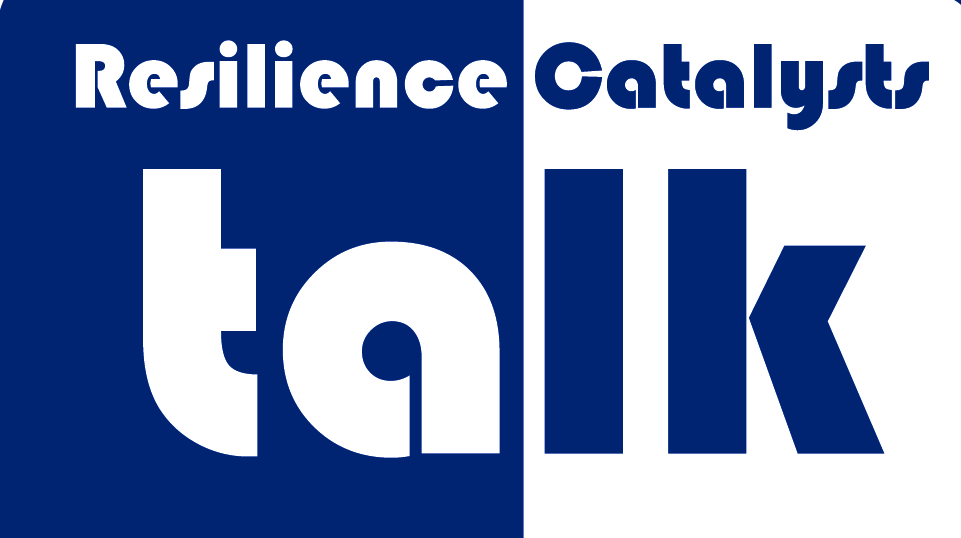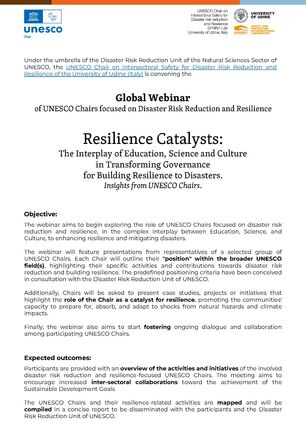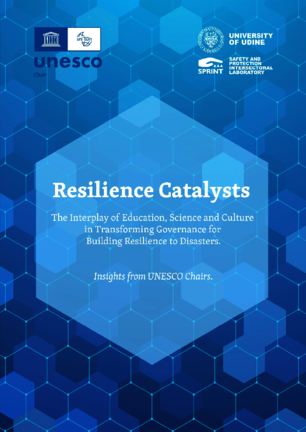The Resilience Catalysts Initiative
A Hub for Interdisciplinary Resilience
Launched in June 2024 by the UNESCO Chair on Intersectoral Safety for Disaster Risk Reduction and Resilience of the University of Udine in Italy, the Resilience Catalysts is a groundbreaking initiative under the umbrella of the Disaster Risk Reduction Unit of the Natural Sciences Sector of UNESCO.
Acknowledging the complex interplay between UNESCO's pillars of Education, Science, and Culture, the Resilience Catalysts initiative investigates how UNESCO Chairs, focused on disaster risk reduction and resilience, can effectively contribute to transforming governance for resilience and showcases the essential contributions of these Chairs in advancing UNESCO's impact across its diverse areas of work.
This initiative brings together a network of UNESCO Chairs and international experts specializing in:
Disaster Risk Reduction and Resilience Engineering
Water, Energy, and Disaster Management
Urban Resilience and Cultural Heritage Sustainability
Informatics and Multi-hazard Modelling
Etc.
Objectives
Map and align the resilience-related activities of UNESCO Chairs globally to create a unified knowledge base.
Bridge the gap between high-level scientific research and practical disaster risk reduction strategies.
Foster a continuous exchange between different academic disciplines to address the multifaceted nature of modern risks and look for the development of new collaborations.
Activities
The initiative’s activities are designed to showcase the contributions of UNESCO Chairs in advancing UNESCO priorities, feature a structured calendar of 'Resilience Talks' that facilitate the exchange of scientific knowledge and practical field experiences and provide insights and solutions for building a more resilient world:
- Visit our calendar for upcoming events and stay updated on the latest developments in resilience and disaster risk reduction.
- Learn more about UNESCO Chairs' contributions in advancing UNESCO priorities.
- Access a wealth of resources, including recorded webinars and talks as well as reports.
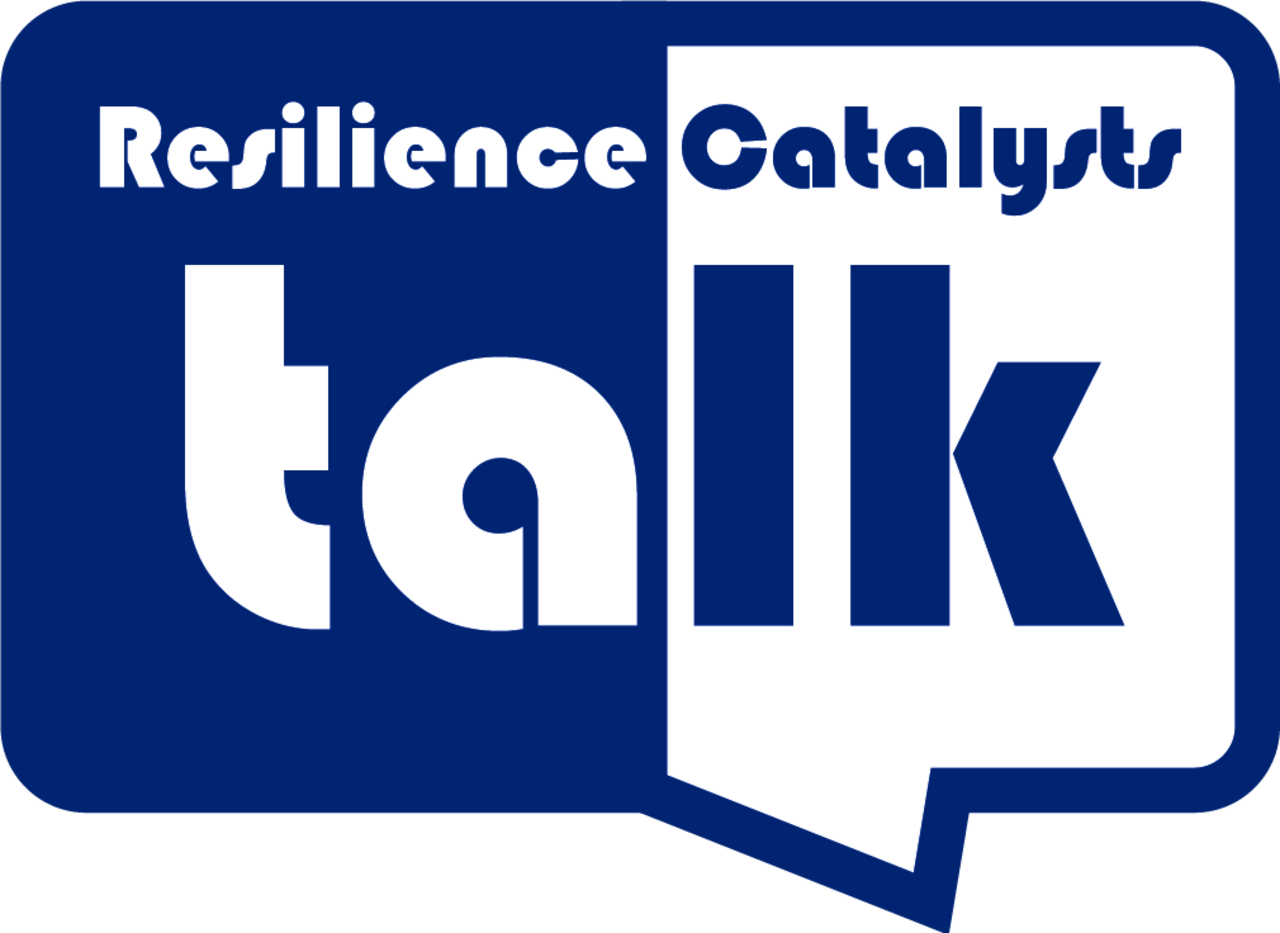
Calendar of Talks by UNESCO Chairs
Discover groundbreaking research and initiatives focused on resilience and disaster risk reduction through our series of talks led by UNESCO Chairs, which delves into topics such as climate change adaptation, sustainable infrastructure, and community resilience. Stay tuned for more information on specific dates and speakers.
UNESCO Chair on Disaster Risk Reduction and Resilience Engineering; University College London (United Kingdom)
UNESCO Chair on Water, Energy and Disaster Management for Sustainable Development; Kyoto University (Japan)
UNESCO Chair on Water-related Disaster Risk Reduction; University of Ljubljana (Slovenia)
UNESCO Chair in Informatics and Multi-hazard Risk Reduction; Loughborough University (United Kingdom)
UNESCO Chair on Urban Resilience; University of Southern Denmark (Denmark)
UNESCO Chair in Cultural Heritage Management and Sustainability, Institute of Advanced Studies in Kőszeg (Hungary)
UNESCO Chair on Prevention and sustainable management of geo-hydrological hazards, University of Florence (Italy)
UNESCO Chair on Intersectoral Safety for Disaster Risk Reduction and Resilience; University of Udine (Italy)
[tentative date]
Chair contributions to UNESCO fields and outcomes
| Chair title (Country) - Chairholder | Intersectoral Chart | Footprint Chart | Most relevant disaster risk reduction and resilience-related projects of the Chair |
| UNESCO Chair on Water, Energy and Disaster Management for Sustainable Development; Kyoto University (Japan) - Yasuto Tachikawa |  |  | 1) An interdisciplinary graduate-level HESD education program in the fields of water, energy, disaster and environmental issues; 2) IHP training course on integrated basin management under changing climate; 3) UNESCO chair field work: water, forest and society |
| UNESCO Chair on Cultural Heritage and Risk Management; Ritsumeikan University (Japan) - Junko Mukai |  |  | 1) International Training Course (ITC) on Disaster Risk Management of Cultural Heritage annually implemented in Kyoto area in Japan; 2) Publication of "A Training Guide on Disaster Risk Management of Cultural Heritage in Urban Areas" and "Good Practices for Disaster Risk Management of Cultural Heritage: Practices of ITC Participants" (Routledge Studies in Hazards, Disaster Risk and Climate Change); 3) Workshop and symposium on Good Practices for Disaster Risk Management of Cultural Heritage implemented online |
| UNESCO Chair in Cultural Heritage Management and Sustainability;University of Pannonia; The Institute for Social and European Studies Foundation (ISES) (Hungary) - Akos Jacobi |  |  | Information not available |
| UNESCO Chair on Urban Resilience; University of Southern Denmark (Denmark) – Nicola Tollin | 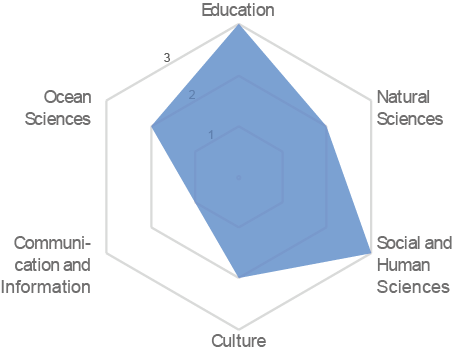 | 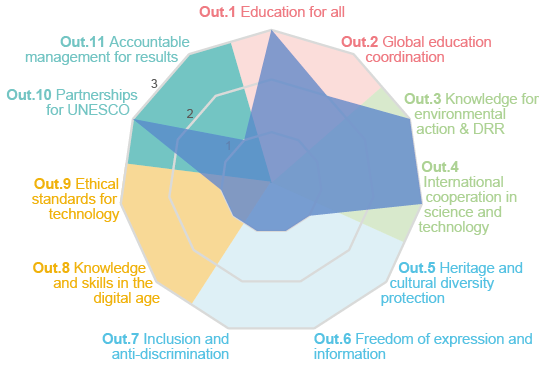 | 1) Urban Resilience Intensive Training (URIT, Copenhagen and Bangkok); 2) Assessment of Regional and Municipalities climate plans (Region South Denmark, Denmark); 3) Assessment of the NDCs (UN-Habitat NDCs, world); 4) Floods and droughts PhD project (Copenhagen) |
| UNESCO Chair on Gender, Vulnerability and Well-being in Disaster Risk Reduction Support; Kobe University (Japan) – Ronni Alexander |  | 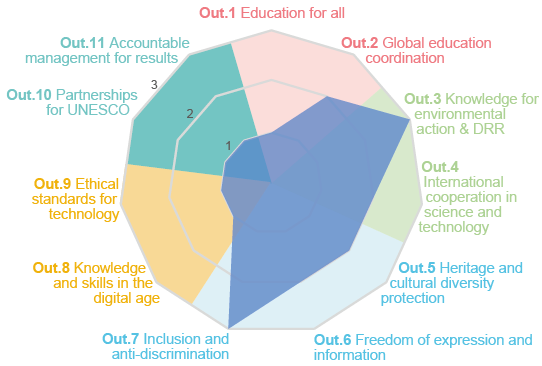 | 1) 2018-2019: Education Program Summer Course (Gadjah Mada University, Indonesia); 2) 2020~presen: Education Program Online Conference (Kobe, Japan); 3) Research Program: publication of the book: "Making Disaster Safer: A Gender and Vulnerability Approach" (Springer, 2023) |
| UNESCO Chair in Societal Climate Change Research and Resilience; Universität Hamburg (Germany) - Beate Ratter | 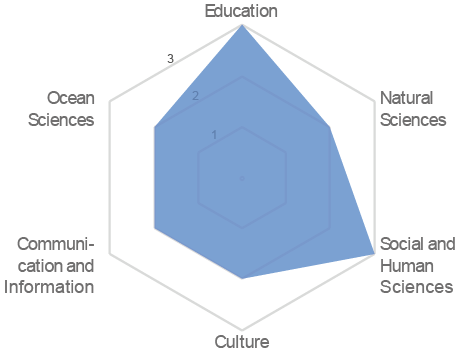 | Information not available | 1) Waters at the coasts of Northern Germany; 2) CUORE - cultures of response in Taiwan and Germany |
| UNESCO Chair on Disaster Risk Reduction and Resilience Engineering; University College London (United Kingdom) – Dina D'Ayala | 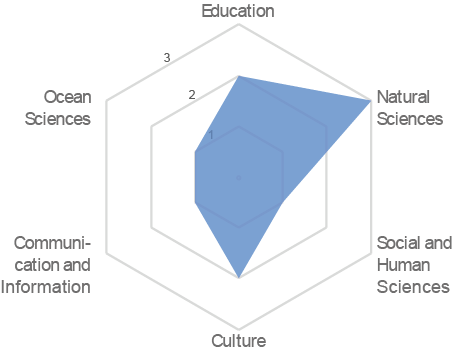 | 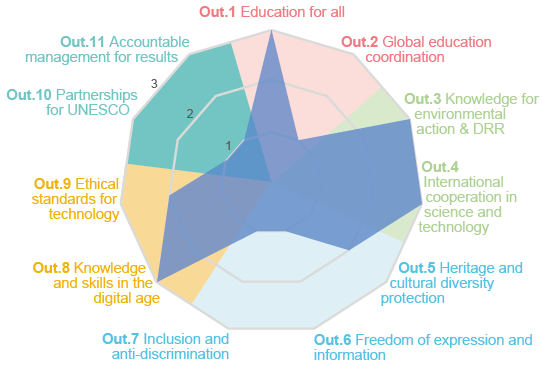 | 1) Minimize education disruption following natural hazards - Case study in Cagayan de Oro; 2) BERLAC Project UNESCO DRR UNIT: Leveraging artificial intelligence to minimize education disruption following natural hazards; 3) Performance based probabilistic seismic risk assessment for urban heritage. Applications and new developments of the FaMIVE approach; 4) Webinar series |
| UNESCO Chair on Intersectoral Safety for Disaster risk reduction and Resilience; University of Udine (Italy) – Stefano Grimaz |  |  | 1) VISUS projects: Visual Inspections for defining safety upgrading strategies, in the educational sector; 2) SERM Academy: Safety and Emergency Response Management training school; 3) ResiliEnhance Program and Platform: Enhancing the Resilience to Disasters for Sustainable Development |
| UNESCO Chair on Solid Earth Physics and Geohazards Risk Reduction; Hellenic Mediterranean University (Greece) - Filippos Vallianatos | 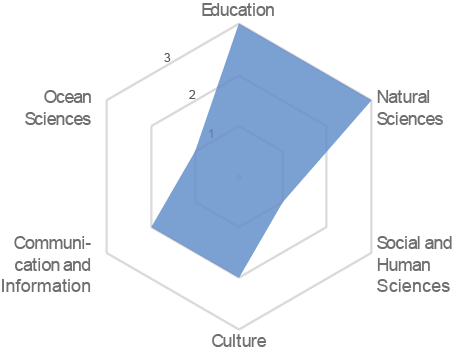 |  | Information not available |
| UNESCO Chair on the Prevention and Sustainable Management of Geohydrological Hazards; University of Florence (Italy) - Nicola Casagli |  |  | 1) Regionally consistent risk assessment for earthquakes and floods and selective landslide scenario analysis for strengthening financial resilience and accelerating risk reduction in Central Asia; 2) Multi-risk science for resilient communities under a changing climate; 3) International Consortium on Landslides (ICL) |
| UNESCO Chair on Water-related Disaster Risk Reduction; University of Ljubljana (Slovenia) - Matjaz Mikos | 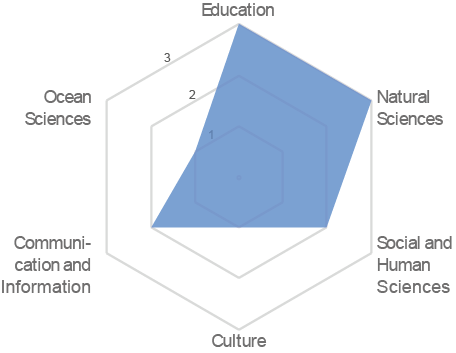 |  | 1) Contributing to interdisciplinary international Erasmus+ Master study program on Flood Risk Management since 2011; 2) World Center of Excellence in Landslide Risk Reduction since 2008; 3) National research project: Evaluation of hazard-mitigating hybrid infrastructure under climate change scenarios (2022-2024) |
| UNESCO Chair in Informatics and Multihazard Risk Reduction; Loughborough University (United Kingdom) – Qiuhua Liang |  |  | Information not available |
| UNESCO Chair for Science, Technology, and Engineering Education; AGH University of Krakow (Poland) – Janusz Szpytko |  |  | Information not available |
| UNESCO Chair in Futures Studies, Storytelling and Anticipation: Living Traditions, Transitions, and Resilience; University of Makeni (Sierra Leone) - Kelawei Kamara | Information not available | Information not available | Information not available |
| UNESCO Chair for Seismic Studies and Tsunami Hazards; Sultan Qaboos University (Oman) - Issa El-Hussain | 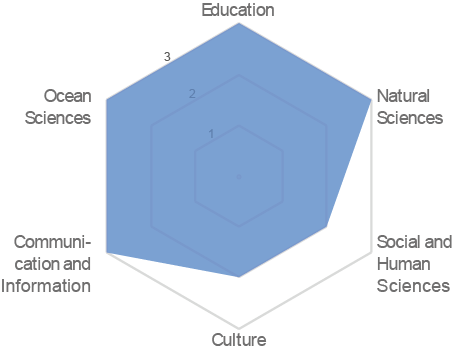 |  | 1) Implement large Strong Motion Seismic Network in Oman, Oman; 2) Multi-criteria risk assessment framework for enhancing earthquake preparedness for urban environment, Al-Seeb, Oman; 3) Seismic Hazard Assessment at Musandam Gas Plant, Oman |
Resources
[Concept note] Resilience Catalysts concept note
The Interplay between Education, Science and Culture in Transforming Governance for Building Resilience to Disasters. Insights from UNESCO Chairs
The Resilience Catalysts initiative aims to begin exploring the role of UNESCO Chairs focused on disaster risk reduction and resilience, in the complex interplay between Education, Science, and Culture, to enhancing resilience and mitigating disasters.
The initiative aims to start fostering ongoing dialogue and collaboration among participating UNESCO Chairs.
[REPORT] Resilience Catalysts
The Interplay between Education, Science and Culture in Transforming Governance for Building Resilience to Disasters. Insights from UNESCO Chairs
Our recent webinar explored the vital role of UNESCO Chairs in advancing disaster risk reduction and resilience. Through the intersection of education, science, and culture, these institutions are making a significant contribution to global preparedness and response efforts. Discover key takeaways and insights from this informative event in our comprehensive report.
[VIDEO] Resilience Catalysts - Launch Event
The Interplay between Education, Science and Culture in Transforming Governance for Building Resilience to Disasters. Insights from UNESCO Chairs
In our launch webinar, we explored the vital role of UNESCO Chairs in advancing disaster risk reduction and resilience. By leveraging the intersection of Education, Science, and Culture, these institutions are making a significant impact on global preparedness and response efforts. Discover key takeaways and insights from this informative event.
[VIDEO] Resilience Catalysts - Talk 1
Multi-Hazard Risk and Resilience of Educational Infrastructure
The resilience of school systems and infrastructure that serves them to multiple hazards is the main research objective of the UNESCO Chair on Disaster Risk Reduction and Resilience Engineering (University College London, United Kingdom) mission. A second major objective is to create a global community of practice and improvement of the technical proficiency of colleagues and stakeholders, involved in improving and delivering school infrastructure worldwide.
This first Talk of the Resilience Catalysts Talks Series will illustrate some of the projects and collaborations developed by the Chair since its inception 3 years ago and the identification of future directions of development and opportunities for interaction with other Resilience Chairs.
[VIDEO] Resilience Catalysts - Talk 2
Interdisciplinary HESD for Creating Resilient Societies
The UNESCO Chair on Water, Energy and Disaster Management for Sustainable Development (WENDI) at Kyoto University (Japan) provides a comprehensive and interdisciplinary graduate-level Higher Education for Sustainable Development (HESD) in the fields of water, energy, disaster and environmental issues. The course programs for the HESD are provided by Kyoto University researchers across institutional boundaries. The webinar introduces WENDI activities by following five talks and discuss how to enhance international HESD.
[VIDEO] Resilience Catalysts - Talk 3
Enhancing Resilience of Water Structures: Causes, Studies, and Solutions from Slovenia
The UNESCO Chair on Water-Related Disaster Risk Reduction (WRDRR) at the University of Ljubljana (Slovenia) undertakes research activities that are an intricate part of joint worldwide efforts to reduce disaster risks and to mitigate their unavoidable consequences. This talk introduces the WRDRR Chair and its activities, covering the analysis of the 2023 floods in Slovenia, structural health monitoring of dams, mitigation of Alpine torrential hazards with a case study from Krvavec, and the NATURE DEMO project on nature-based solutions for climate-resilient infrastructure.
[VIDEO] Resilience Catalysts - Talk 4
High-Performance Multi-Hazard Modelling for Disaster Risk Reduction
The UNESCO Chair in Informatics and Multi-hazard Risk Reduction (IMRR) aims to co-develop, disseminate and support implementation of informatics technology solutions (e.g., high-performance computing, AI, big data analytics, digital twins) for multi-hazard risk assessment and management, thus enhancing global capacity for disaster risk reduction and sustainable development. The talk will introduce some of the recent research developments and activities of the IMRR Chair, and discuss potential opportunities for collaborations.
[VIDEO] Resilience Catalysts - Talk 5
Urban Resilience
The talk focuses on urban resilience, integrating climate change, disaster risk reduction and sustainable development in cities and territories. The first part gives an overview on key activities of the UNESCO Chair on Urban Resilience (SDU.Resilience). The second part provides a deep dive on the urban resilience components and interlinkages between national climate policies and local climate plans. The last part of the talk is dedicated to an open discussion with the participants, aimed also at exploring collaboration possibilities.
[VIDEO] Resilience Catalysts - Talk 6
Cultural Heritage Management and Sustainability
The UNESCO Chair of Cultural Heritage Management and Sustainability was established in 2011 at the Institute of Advanced Studies in Kőszeg (iASK) and integrated into iASK in 2017. The Chair serves as a regional center for promoting cultural heritage preservation practices and developing innovative research and study programs. During this Talk, the results of current research and the activities of the Chair are presented.
[VIDEO] Resilience Catalysts - Talk 7
Risk Assessment and Early Warning for Community Resilience
The UNESCO Chair on Prevention and sustainable management of geo-hydrological hazards, University of Florence (Italy), focuses on applied research on geo-hydrological hazards. In this Talk, members of the UNESCO Chair showcase recent research activities:
- AI for landslide hazard and risk assessment
- Landslide early warning systems and monitoring strategies for risk management
- Towards impact-based EWS for floods
- Community participation for flood risk assessment of art cities
